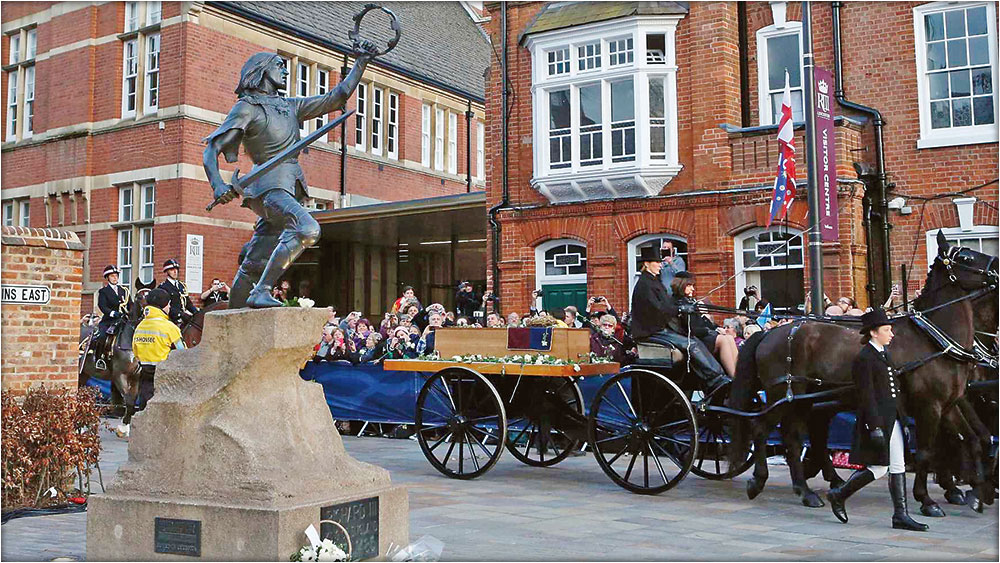ASIA’S ACQUITTAL WELCOMED IN UK
- 10 Nov - 16 Nov, 2018
Like those who voted for getting out of the EU, it seems the weather too is going mad. We were told that Easter, in the first week of April would be cold and so it was; in fact, it is never too much of a gamble to say that it will be cold in England as it always is, and so we were warned that the whole of April would be freezing cold.

In actual fact, not a bit of it. The last week has seen some of the warmest weather recorded in April for the last 70 odd years, with temperatures in London and the south searing to the dizzying heights of 29OC. It will not last forever, and by the time this sees the light of print, it may well be down closer to average daytime temperature of around 15 or 16OC, which is what one expects at this time of the year. Even those highs are for very brief periods of the day and it makes one wonder what the poet Browning meant when he waxed lyrical about being in England when April’s there.
In fact, English poets and dramatists have quite often been less than completely accurate or honest while describing events in England, although those of us who have studied English Literature in universities in Pakistan, and for that matter anywhere in the subcontinent, would know that to criticise any of them in a tutorial would be seen as being pretty close to blasphemy. Even Jane Austen, who wrote the same novel with almost identical plots some half a dozen times over, has to be revered. It is the same in England; when my son, who was born in England and studied in English educational institutions all his life, suggested to his English teacher that he did not think that Jane Austen was the raving genius she is made out to be, he was shut down with the sort of firm hand that only school teachers and Pakistani Supreme Court judges can command.
But of course, the most respected and admired of all English writers was William Shakespeare. His variety and power of expression made much of the admiration that has gone his way entirely well deserved. Yet, even he, could well have been subject to pressures that left him with little alternative but to twist his version according to the given political wisdom of the day.

Thus, it was that he had his King Richard III flailing at the battle of Bosworth Fields and begging, like a coward, for a horse, for which he was willing to offer his kingdom in the famous line ‘A horse, a horse, my kingdom for a horse’. King Richard was, of course, the last of the Plantagenet kings who was slain at Bosworth Fields, whence the crown passed on to Henry VII, the first Tudor monarch. That was the dynasty to which Queen Elizabeth I belonged, who was the monarch when Shakespeare was writing most of his historical plays, Henry VII being her grandfather, and if Shakespeare had suggested anything other than that Richard III was a coward, or that Henry’s claim to the British throne was only marginally more convincing than mine, he and his works might well have gone the way Geo TV has – or perhaps even worse.
It is a photo finish between Richard III and King John as to who takes first place for being England’s most villainous king, but one feels that thanks to Shakespeare, Richard III wins it in the end. But today, historians are casting doubts over whether Richard III was really the one of the greatest villains of British history as Shakespeare made him out to be.
When Richard’s body was finally exhumed from a car park in Leicester, he had received considerable attention and there has been a lot of debate since as to how bad he actually was. Given the fact that he lived in a brutal age, his involvement in the alleged killing of his nephews in the Tower of London is said to be par for the course in medieval times; in fact, it has even been suggested that Margaret Beaufort, Henry VII’s mother, could also have been responsible for their murder. Following the exhumation of Richard’s body the sight of the excavation was given scheduled monument status, recognising it as a site of great historical importance. There was an animated discussion on whether the body of the former King should be interred in Leicester, where it had been found, or should be buried in York, as he was a member of house of York. The matter had to be ultimately decided in a court of law. One of the judges who adjudicated in the dispute, Lady Justice Hallet, will now be taking part in a fictional trial of Richard III before a theatre audience in which the audience will be the jury deciding whether or not he was responsible for ordering the deaths of the princes in the Tower.
The question to arise is whether now, 533 years after Richard was slain at Bosworth Fields, does it matter. When the court case was going on to decide where Richard should be buried, the then Justice Secretary, Chris Grayling, dismissed the case as a “complete waste of taxpayer’s money’’. The judge disagreed and I am happy to note here that this did not lead to Mr Grayling being summoned before their lordships and being threatened with contempt or, for that matter, being denied even the permission to sit down.
I think the point here is that a country that values its history never lets it die and if history has been unfair to someone, even half a millennium down the line, every attempt is made to rectify that error and to set the record straight. And indeed, if the courts are not there to ensure that, then what are they there for. •
COMMENTS